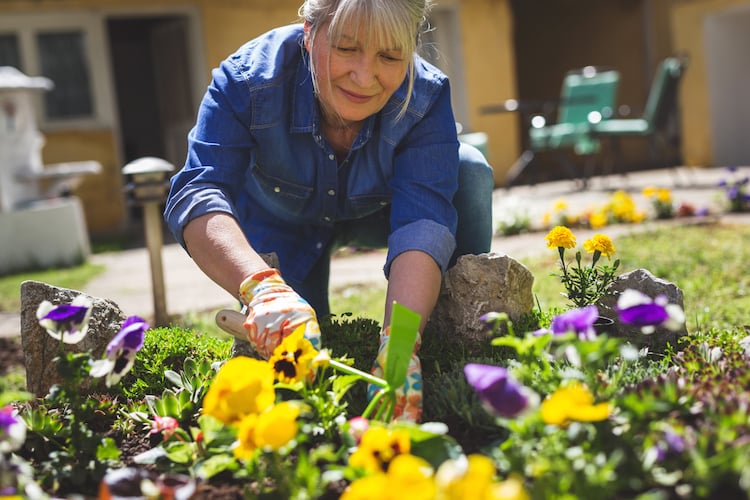Discover enriching skills that add purpose, joy, and fulfillment to your retirement years.

Retirement is more than just a break from work—it’s a new beginning. It’s a time to slow down and reconnect with what brings you joy, curiosity, and meaning. After years of fulfilling responsibilities and keeping a tight schedule, you finally have the freedom to invest in yourself in ways that might have once seemed out of reach.
Exploring new skills not only keeps your mind sharp and your body engaged, but it also brings a renewed sense of purpose to your everyday life. From creative pursuits to active hobbies, there’s no shortage of meaningful ways to fill your time with passion, discovery, and joy. Here are 13 easy-to-learn and rewarding skills that can make your retirement years not only vibrant but deeply satisfying.
1. Gardening for Relaxation

Gardening isn’t just about growing pretty flowers or fresh vegetables—it’s a deeply nourishing activity that engages your senses and brings a sense of peace. Whether you have a sprawling backyard or a few containers on a balcony, tending to plants teaches patience and provides daily purpose. Feeling the soil, watering your plants, and watching them flourish can be incredibly grounding. The process of nurturing life creates a quiet rhythm that can become a cherished part of your daily routine.
Over time, gardening also connects you more closely with the seasons and with nature’s cycles. You might start recognizing the subtle changes in your environment—birdsong, weather shifts, or blooming patterns. These moments bring a heightened sense of awareness and gratitude. Plus, if you’re growing herbs or vegetables, there’s added joy in eating something you raised from a tiny seed, according to Nicole Burke of Gardenary. It’s an endlessly rewarding skill that offers both serenity and satisfaction.
2. Learning to Play an Instrument

There’s something magical about picking up an instrument and creating music with your own hands. It doesn’t matter if you’ve never played a note before—retirement is a perfect time to start learning. Instruments like the piano, ukulele, or acoustic guitar are particularly approachable and offer immediate gratification as you pick up simple chords and melodies. Every small improvement feels like a personal triumph and opens up new creative doors.
Music taps into emotions and memories, creating a powerful connection to your past and a joyful gateway into your present. Practicing regularly improves hand-eye coordination, focus, and memory—important areas to nurture as we age. If you enjoy socializing, playing music with others or taking group lessons can also become a meaningful way to connect and share your progress. Over time, music can shift from a hobby into a soul-deep passion that brings calm, joy, and a renewed sense of discovery, Adaeze Sokan of Medium.com stated.
3. Mastering Photography

Photography invites you to see the world with fresh eyes, as per writers at Aesthetics of Photography. It teaches you to notice the little things—a shaft of light through the window, the texture of a tree’s bark, the way someone smiles when they’re not looking. Whether you use a smartphone or a DSLR camera, the fundamentals of good photography—composition, lighting, timing—are accessible and easy to build on over time. Each photo becomes a small story you’ve captured forever.
What makes photography especially meaningful in retirement is the opportunity to document your life, travels, family, or natural surroundings. You can explore portrait photography, macro shots, or landscapes, turning ordinary moments into lasting memories. Sharing your images through social media or printed albums helps keep you connected with loved ones and leaves a visual legacy. And as you get better, photography becomes less about taking a photo and more about seeing the beauty in your everyday life.
4. Cooking New Recipes

Cooking becomes less of a chore and more of a joyful experiment when you have the time to explore it fully. Trying new recipes from around the world introduces you to different cultures, flavors, and techniques. It’s an invitation to travel through your taste buds. Whether you’re learning to make homemade pasta, mastering a perfect curry, or baking crusty bread from scratch, cooking engages all your senses and brings immediate, delicious rewards.
The process also becomes a mindful practice—chopping, stirring, seasoning—all carried out at a slower, more intentional pace. Cooking for yourself means you can eat exactly how you want: healthier, tastier, and more creatively. And when you cook for others, you’re sharing something deeply personal. Meals become a way to nurture relationships and build memories. Over time, your kitchen transforms into a space of creation, celebration, and comfort.
5. Writing and Journaling

Putting pen to paper—or fingers to keyboard—can be one of the most powerful ways to process life’s journey. Whether you journal privately, write poetry, draft your memoirs, or start a personal blog, writing helps you find clarity, express emotion, and preserve moments that matter. It allows you to make sense of your experiences and rediscover yourself in the process.
Writing can also bring healing. Revisiting past events with the benefit of hindsight can provide closure and insight. Daily journaling sharpens awareness, enhances memory, and even improves sleep. It’s a habit that doesn’t require perfection—only honesty. And over time, you may find that your words aren’t just for you. They might become a source of inspiration for others, a record for your family, or even the foundation for a book you never thought you’d write.
6. Painting or Drawing

You don’t need to be a born artist to enjoy the magic of putting color on canvas or sketching lines on a page. Painting and drawing are deeply personal forms of self-expression that offer a quiet refuge from the busyness of life. As you experiment with watercolors, acrylics, or pencils, you’ll discover that creating art is more about the process than the product.
Each session becomes a chance to explore your inner world—your emotions, your memories, your imagination. You’ll start seeing the world differently too, noticing shadows, shapes, and subtle beauty all around you. Art improves hand coordination and sharpens focus, while also offering moments of pure joy. Whether you’re taking a local art class or painting quietly at home with music playing in the background, the act of creating something uniquely your own can be deeply satisfying.
7. Learning a New Language

Retirement is an ideal time to pick up a new language—something that once seemed like a luxury of time now becomes a rewarding intellectual challenge. Whether it’s French, Spanish, Italian, or something more unusual, learning a language exercises your brain in a way few other activities do. It sharpens memory, boosts problem-solving skills, and helps delay cognitive decline.
Beyond the mental benefits, learning a new language opens up cultural doors. If you enjoy travel, speaking even a little of the local language can transform your experience—allowing deeper conversations, authentic encounters, and a greater appreciation for the people and places you visit. It’s also a wonderful way to meet others, through language meetups or online communities. Over time, what begins as a hobby can turn into a bridge to new friendships and new ways of seeing the world.
8. Practicing Yoga or Tai Chi

Gentle, flowing movements. Focused breathing. A quiet mind. Yoga and tai chi offer a beautiful blend of physical wellness and inner calm, making them perfect for retirement. These practices help improve flexibility, strength, and balance—critical for preventing falls and maintaining mobility. But they also go deeper, helping you reconnect with your body in a mindful, respectful way.
Practicing regularly brings a sense of groundedness and emotional stability. You learn to breathe through discomfort, to stay present, and to listen to your body’s needs. Whether in a class with others or following a video at home, the routine becomes a ritual of care and reflection. Over time, you’ll likely feel more centered, more energized, and more in tune with yourself than ever before. It’s a gentle but transformative path to holistic well-being.
9. Woodworking and DIY Projects

There’s something incredibly satisfying about building something with your own two hands. Woodworking and DIY projects combine creativity, precision, and problem-solving in a way that keeps your brain and body working together. Whether you’re crafting a simple shelf or designing custom furniture, the process teaches patience and builds confidence.
This hands-on skill can also be a wonderful way to contribute meaningfully to your home or to others. You might make keepsake boxes for your grandchildren, repair items around the house, or create gifts that are both beautiful and functional. Each finished piece is a reminder of your capability and care. And the act of working with your hands—cutting, sanding, assembling—becomes a therapeutic practice that calms the mind and energizes the spirit.
10. Exploring Digital Skills

The digital world can feel overwhelming at first, but learning to navigate it brings huge benefits. From emailing loved ones to managing photos, paying bills online, or joining virtual groups, digital skills help you stay connected and independent. Start small—maybe with basic computer tasks, learning video calls, or exploring social media—and build from there.
Over time, the digital world becomes a rich landscape of opportunity. You might find a favorite YouTube channel, take free online classes, or join a community forum around one of your hobbies. Technology also opens doors to telehealth, news, learning, and even travel planning. Staying tech-savvy empowers you to participate fully in modern life and stay in touch with the world, friends, and family—on your own terms.
11. Volunteering in the Community

Few things add more meaning to your days than giving your time and talents to help others. Volunteering provides structure, social interaction, and a deep sense of purpose. Whether you’re mentoring young students, helping at a food pantry, or offering companionship to seniors in need, your efforts matter—and are often deeply appreciated.
Volunteering also gives you a chance to share your life experience, wisdom, and skills in ways that directly benefit others. You’ll meet new people, learn new things, and perhaps even discover hidden talents. It’s a reciprocal act: you give, but you also receive—connection, gratitude, and a clearer sense of belonging. Retirement isn’t the end of your contribution; in many ways, it’s just the beginning of a new kind of impact.
12. Birdwatching for Peace of Mind

Birdwatching is quiet, meditative, and unexpectedly joyful. It encourages you to slow down, observe, and appreciate the subtle rhythms of nature. Whether you’re watching finches at your backyard feeder or hiking through a wooded trail with binoculars, birdwatching helps you stay present and connected to your environment.
Over time, you’ll begin to recognize calls, migratory patterns, and nesting behaviors. You’ll feel a sense of companionship with the birds and perhaps develop a deeper appreciation for conservation and ecology. Many people find birdwatching to be a form of mindfulness—a chance to step out of worry and into wonder. Joining a birdwatching group or tracking sightings in a journal can deepen the experience even more, making each outing a small adventure.
13. Mastering Public Speaking

Public speaking might sound intimidating, but it’s an empowering skill that can transform your confidence and expand your influence. Retirement offers the perfect time to develop your voice, especially if you have life stories, lessons, or passions you want to share. Speaking clearly and confidently can open doors to leading workshops, teaching classes, giving speeches, or mentoring others.
Organizations like Toastmasters offer a welcoming place to practice in a supportive environment. As you grow more comfortable, you’ll realize that your experiences hold great value—and that others can benefit from hearing them. Public speaking isn’t just about standing in front of a crowd; it’s about finding your voice and using it with purpose. Whether you’re speaking to a group of five or fifty, the impact can be lasting—for both you and your audience.
